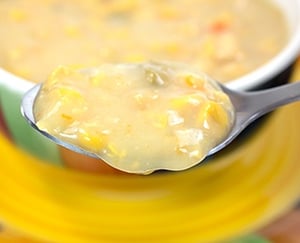Published: August 22, 2018
 A vegetarian diet is not for everyone. But is there a benefit to considering just one day per week when you do not eat meat? A number of organizations are introducing the concept of “Meatless Monday” as an option for healthier eating… and maybe a healthier planet.
A vegetarian diet is not for everyone. But is there a benefit to considering just one day per week when you do not eat meat? A number of organizations are introducing the concept of “Meatless Monday” as an option for healthier eating… and maybe a healthier planet.
The concept of “Meatless Monday” dates back to World War I when the U.S. Food Administration urged families to reduce consumption of key staples to aid the war effort. Health advocate Syd Lerner, in association with Johns Hopkins School of Public Health, reintroduced the concept in 2003 as a public health awareness campaign. The message of “one day a week, cut out meat” is a way for you to do something good for your health and for your planet.
Why go meatless?
The average American today eats as much as 75 more pounds of meat each year than previous generations. Excessive consumption of meat has been linked with such chronic diseases as heart disease, type 2 diabetes, obesity and cancer. By contrast, eating meals rich in fruits, vegetables and legumes deliver natural antioxidants that benefit cardio health.
Increasing plant-based food in your diet may also have a positive effect on weight and BMIs, which are correlated to type 2 diabetes. Eating less meat and more plant-based foods can lead to a better quality of life and increased longevity.
Consuming a plant-based diet can also benefit the environment. According to the Food and Agricultural Organization, 14.5% of global human-caused greenhouse gas (GHG) emission is estimated to come from livestock. The EPA estimates that livestock contributes to more than one-third of methane emissions.
_______________________________________
Related: Simply Scrumptious Healthy Snacks
_______________________________________
Why choose Monday?
There is science behind it. Evidence suggests that healthy thinking and behavior occur more often on Mondays, when people are likely to start diets or exercise regimens, quit smoking or schedule doctor’s visits.
Why one day? Taking small steps that build over time can help people sustain healthy behavior. In fact, 69% of people say that taking small steps rather than doing everything at once makes it easier to achieve health goals. Frequent messages can improve behaviors.
Meatless Monday is a global movement powered by a growing number of individuals, hospitals, universities, worksites and restaurants. This is our future and at Kendal we see more residents, staff and potential residents demanding plant-based options. Kendal at Oberlin regularly offers vegan and vegetarian menu options that enable residents to make healthy dietary choices.
The following vegan recipe is from Kendal at Oberlin chef, Wayne Jacobs. Made with fresh sweet corn, it will be a perfect addition to your Meatless Monday meal. It is so good that it was included in a vegan cookbook, written by Ann Crile Esselstyn. Enjoy!
Oberlin Corn and Shallot Chowder
(Makes 4 servings)
Ingredients:
1 shallot, chopped (1/2 cup)
1 large stalk celery, chopped (1/2 cup)
2 cups vegetable broth
1 (16-ounce) bag frozen sweet corn, thawed – or kernels from 5 to 6 ears of fresh sweet corn
1 Tbsp. white balsamic vinegar
½ tsp. freshly ground black pepper
Instructions:
Put shallot, celery and broth in a medium saucepan. Bring to a boil and then reduce the heat to maintain a simmer. Cook until the vegetables are soft, about 10 minutes.
Transfer the shallot mixture to a food processor, add the corn and balsamic vinegar. Process until smooth.
Return the soup to the pan and heat until just simmering. Watch closely – do not overcook the soup or it will lose its vibrant color. Remove from heat, add pepper to taste and serve.
Eating Healthy All Week Long
Of course, healthy diet options aren’t limited to Meatless Mondays. For more tips on vegetarian diets, read Vegetarian Diet: Healthy and Easy.
You can also sign up for our Kendal Connection newsletter to receive helpful articles on active living, life-long learning and health tips.
Feed Your Body Right: Nutritional Needs After 50
As you age, having a healthy and balanced diet will help you look and feel your best while helping prevent many serious health issues. Learn how in our free guide.
 Sue Campbell, RD, LD: Sue is the Community Nutritionist at Kendal at Oberlin in Oberlin, Ohio. She studied at Ohio University and graduated with a degree in Dietetics in 1992. She works with older adults and particularly enjoys wellness topics, cooking and writing.
Sue Campbell, RD, LD: Sue is the Community Nutritionist at Kendal at Oberlin in Oberlin, Ohio. She studied at Ohio University and graduated with a degree in Dietetics in 1992. She works with older adults and particularly enjoys wellness topics, cooking and writing.




